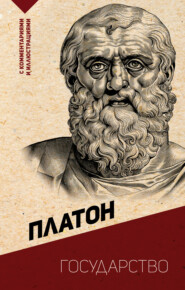По всем вопросам обращайтесь на: info@litportal.ru
(©) 2003-2025.
✖
The Republic
Настройки чтения
Размер шрифта
Высота строк
Поля
But ought we to attempt to construct one? I said; for to do so, as I am inclined to think, will be a very serious task. Reflect therefore.
I have reflected, said Adeimantus, and am anxious that you should proceed.
A State, I said, arises, as I conceive, out of the needs of mankind; no one is self-sufficing, but all of us have many wants. Can any other origin of a State be imagined?
There can be no other.
Then, as we have many wants, and many persons are needed to supply them, one takes a helper for one purpose and another for another; and when these partners and helpers are gathered together in one habitation the body of inhabitants is termed a State.
True, he said.
And they exchange with one another, and one gives, and another receives, under the idea that the exchange will be for their good.
Very true.
Then, I said, let us begin and create in idea a State; and yet the true creator is necessity, who is the mother of our invention.
Of course, he replied.
Now the first and greatest of necessities is food, which is the condition of life and existence.
Certainly.
The second is a dwelling, and the third clothing and the like.
True.
And now let us see how our city will be able to supply this great demand: We may suppose that one man is a husbandman, another a builder, some one else a weaver – shall we add to them a shoemaker, or perhaps some other purveyor to our bodily wants?
Quite right.
The barest notion of a State must include four or five men.
Clearly.
And how will they proceed? Will each bring the result of his labours into a common stock? – the individual husbandman, for example, producing for four, and labouring four times as long and as much as he need in the provision of food with which he supplies others as well as himself; or will he have nothing to do with others and not be at the trouble of producing for them, but provide for himself alone a fourth of the food in a fourth of the time, and in the remaining three fourths of his time be employed in making a house or a coat or a pair of shoes, having no partnership with others, but supplying himself all his own wants?
Adeimantus thought that he should aim at producing food only and not at producing everything.
Probably, I replied, that would be the better way; and when I hear you say this, I am myself reminded that we are not all alike; there are diversities of natures among us which are adapted to different occupations.
Very true.
And will you have a work better done when the workman has many occupations, or when he has only one?
When he has only one.
Further, there can be no doubt that a work is spoilt when not done at the right time?
No doubt.
For business is not disposed to wait until the doer of the business is at leisure; but the doer must follow up what he is doing, and make the business his first object.
He must.
And if so, we must infer that all things are produced more plentifully and easily and of a better quality when one man does one thing which is natural to him and does it at the right time, and leaves other things.
Undoubtedly.
Then more than four citizens will be required; for the husbandman will not make his own plough or mattock, or other implements of agriculture, if they are to be good for anything. Neither will the builder make his tools – and he too needs many; and in like manner the weaver and shoemaker.
True.
Then carpenters, and smiths, and many other artisans, will be sharers in our little State, which is already beginning to grow?
True.
Yet even if we add neatherds, shepherds, and other herdsmen, in order that our husbandmen may have oxen to plough with, and builders as well as husbandmen may have draught cattle, and curriers and weavers fleeces and hides, – still our State will not be very large.
That is true; yet neither will it be a very small State which contains all these.
Then, again, there is the situation of the city – to find a place where nothing need be imported is wellnigh impossible.
Impossible.
Then there must be another class of citizens who will bring the required supply from another city?
There must.
But if the trader goes empty-handed, having nothing which they require who would supply his need, he will come back empty-handed.
That is certain.
And therefore what they produce at home must be not only enough for themselves, but such both in quantity and quality as to accommodate those from whom their wants are supplied.
Very true.
Then more husbandmen and more artisans will be required?
They will.
Not to mention the importers and exporters, who are called merchants?
Yes.
Then we shall want merchants?
We shall.

















